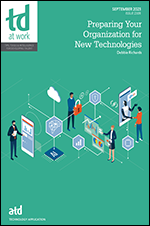Handbook of Human Resource Development
- 15h 11m
- Michael Lane Morris, Neal E. Chalofsky, Tonette S. Rocco
- John Wiley & Sons (US)
- 2014
Address the fundamental concepts and issues that HR professionals face daily with the Handbook of Human Resource Development.
Editors Neal Chalofsky, Tonette Rocco, and Michael Lane Morris have compiled a collection of chapters sponsored by the Academy of Human Resource Development that provide revolutionary insight into the concepts, theories, research initiatives, and practical applications essential to HRD. Topics range from HRD foundations, workforce development, and management to more specific topics such as implementing and managing HRD initiatives in the organization. The chapters are written by professionals who offer a wide range of experience and who represent the industry from varying international and demographic perspectives. The questions addressed include:
- Nationally and internationally, how does HRD stand with regard to academic study and research?
- What is its place in the professional world?
- What are the philosophies, values, and critical perspectives driving HRD forward?
- What theories, research initiatives, and other ideas are required to understand HRD and function successfully within this field?
- As the industry grows, what are the challenges and important issues that professionals expect to face? What hot topics are occupying these professionals now?
The Handbook’s insight and guidelines allows both students and HR professionals to build a fundamental understanding of HRD as an industry, as a field of research, and for future professional success.
In this Book
-
Psychological Foundations of HRD
-
System Theory and HRD
-
Adult Learning Theory and Application in HRD
-
Management and Leadership in HRD
-
Organizational Culture and HRD—The Roots, the Landscape, and the Future
-
Dilemmas in Defining HRD
-
Perspectives on the Concept of Development for HRD
-
A Critical, Feminist Turn in HRD—A Humanistic Ethos
-
Critical HRD
-
Corporate Social Responsibility and HRD—Uneasy Tensions and Future Directions
-
Expertise through the HRD Lens—Research Trends and Implications
-
Competence—Bases for Employee Effectiveness
-
Workplace Learning
-
Guiding HRD Research in the Work/Life Interface—The Importance of Work/Life Harmony in the Development of Interventions
-
The Inner Work of Self-Formation in Work-Related Learning
-
Aging as a Career Development Challenge for Organizations
-
A Social Justice Paradigm for HRD—Philosophical and Theoretical Foundations
-
Disability, Health and Wellness Programs, and the Role of HRD
-
Sexual Orientation and HRD
-
International and Cross-Cultural Perspectives of HRD
-
Contemporary Career Literature and HRD
-
Trends and Issues in Integrating Knowledge Management and Organizational Learning for Workplace Performance Improvement
-
Linking Motivation to Workplace Learning Transfer—The Role of Implementation Intentions and Personal Initiative
-
Coaching
-
Mentoring—Perpetuated on a Myth?
-
Talent Management as a Strategically Aligned Practice
-
HRD Policy—An Overview
-
Legal Aspects of HRD
-
Strategic HRD—Adopting a Philosophy, Strategies, Partnerships, and Transformational Roles
-
Morality and Ethics in HRD
-
HRD in Smaller Firms—Current Issues, Insights, and Future Directions for Research and Practice
-
Action Learning—An HRD Tool for Solving Problems, Developing Leaders, Building Teams, and Transforming Organizations
-
Virtual HRD
-
Developing Strategic Mindsets in HRD—Toward an Integral Epistemology of Practice
-
Employee Engagement and HRD—Exploring the Philosophical Underpinnings, Measurement, and Interventions
-
Emotional Intelligence and Its Critical Role in Developing Human Resources
-
National HRD
-
Certification of HRD Professionals
-
Standards and Accreditation of HRD Academic Programs
-
Future Directions for HRD




